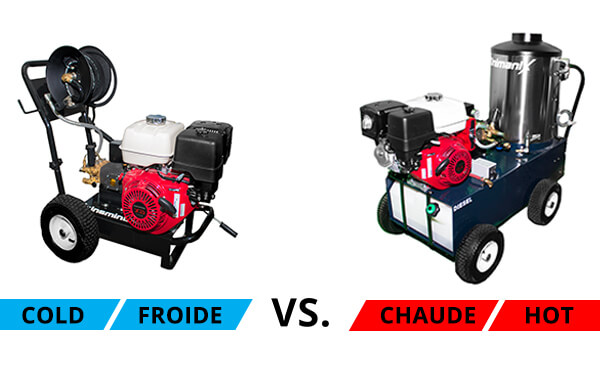For those tough cleaning jobs in construction, food processing, or transportation, as well as any other industry that needs to remove mud, grease, and grime there’s a right industrial-grade pressure washer for the work ahead of you. Here’s some basic information to help you with your selection process.
Is There a Difference in Water Pressure Between Hot and Cold?
The answer is no - there's no difference! We have eau chaude et froide pouvant offrir les mêmes débit, pression ainsi que la même efficacité pour nettoyer toute tâche intérieure, extérieure ou hors terrain. Vous retrouverez dans tous nos modèles la qualité et durabilité à laquelle vous vous attendez de Unimanix.
How Does The A Water Pressure Washer Work?
This brings us to how a Hot Water Pressure Washer makes cleaning more efficient. A hot washer pressure washer needs three actions. The first is heat, second is soap, and the third is agitation, and when combined these elements remove grease and grime quickly and more efficiently.
Because cold water pressure washersare compact, these machines are better suited for small businesses, Whereas cold water falls short in cleaning grease and grime.
Le choix de plusieurs industries tend vers la laveuse à eau chaude pour sa versatilité à pouvoir nettoyer soit avec de l’eau froide ou chaude. L’eau chaude s’avère un meilleur choix pour nettoyer les moteurs, les pièces de mécanique, l’huile, la graisse ainsi que pour enlever les mauvaises herbes, tuer les germes et dégeler les ponceaux. Les laveuses à eau froide et chaude combinent deux éléments de base : l’agitation et le savon. Par contre, les laveuses à pression à eau chaude combinent trois éléments : la chaleur, l’agitation et le savon procurant ainsi un lavage plus efficace pour presque toutes les applications imaginables des industries.
How Does The A Water Pressure Washer Work?
This brings us to how a Hot Water Pressure Washer makes cleaning more efficient. A hot washer pressure washer needs three actions. The first is heat, second is soap, and the third is agitation, and when combined these elements remove grease and grime quickly and more efficiently.
Here’s How The Hot Water Pressure Washer Works:
- Heat: causes molecules to move fast, colliding with each other so much so that they push the cleaning agent to increase its activity thereby reducing the water’s surface tension. As a result, the heated cleaning agent effectively penetrates grime at the molecular level.
- Agitation: is created by friction when the volume and pressure of the water hit the surface.
- Detergent: combined with heat and agitation, detergent allows the cleaning to begin. Its chemical makeup breaks the sticky dirt that’s tied to the surface. This sticky dirt is made up of oil and grease that attaches to dirt. Detergents include surfactants, which are softening agents to emulsify the oil and grease forcing the oil and water to mix. This mixture is called an emulsion, which carries the sticky dirt that holds the oil and grease and is washed away with the hot water.
Does a Hot Water Pressure Washer Cost More?
While we do understand that price can be a factor in your decision-making, it is better to consider the size of your operation and the scope of work to help you select the right pressure washer you need. If you need to use hot water for your cleaning jobs, the hot water pressure washer will cost more because of the extra complexity to produce hot water. And, that complexity requires additional preventive maintenance requirements. We're looking at the burner assembly, coil, and redundant excess pressure protection, which all need annual tune-ups.
However, a best industrial, portable electric pressure washer will give you a return on investment in reduced labour costs because of better time management due to its effective cleaning method. You’ll also see improved cost saving because you will need less detergent with a hot water pressure washer.
What Is The Heating Water Process In A Unimanix Pressure Washer?
You’ll need a hose for water supply. The water enters the pressure washer from a spigot or tank that passes through a high-pressure pump. This pump pushes the water through a heating coil that is made up of 200 feet of half-inch, schedule 80, steel pipe or tubing.
The heating coil is a circular winding configuration that gets the water at maximum exposure to the flame, fuelled by diesel oil or natural gas that heats through the center of the coil. For electric models, at Unimanix, we use stainless steel coils with internal heating elements to heat up the water. As the water forces itself out of the coil and through the wand and nozzle, the temperature will have reached up to 200°F.
